科技英语词汇特点重点讲义资料
- 格式:doc
- 大小:130.50 KB
- 文档页数:11
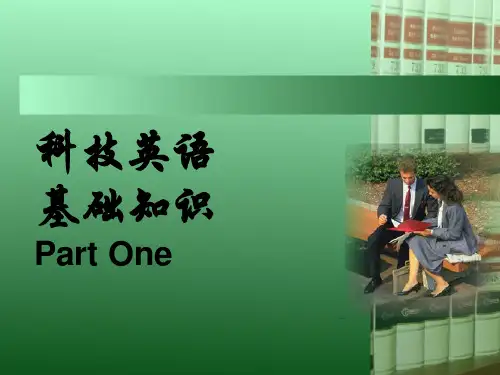



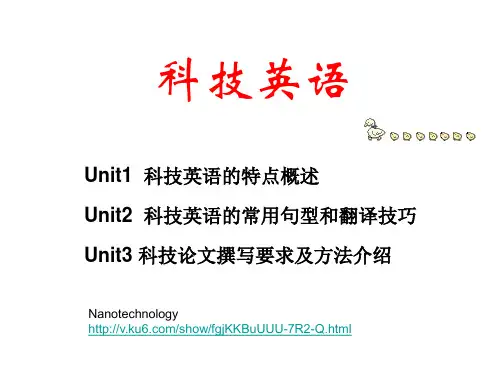
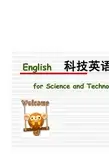
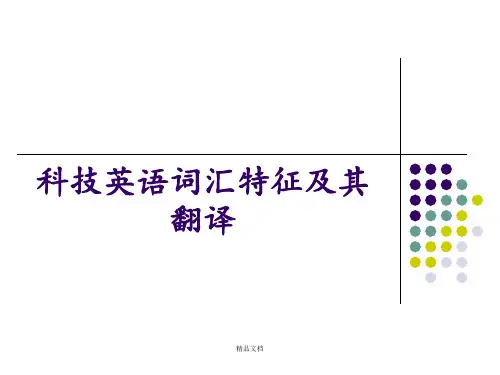

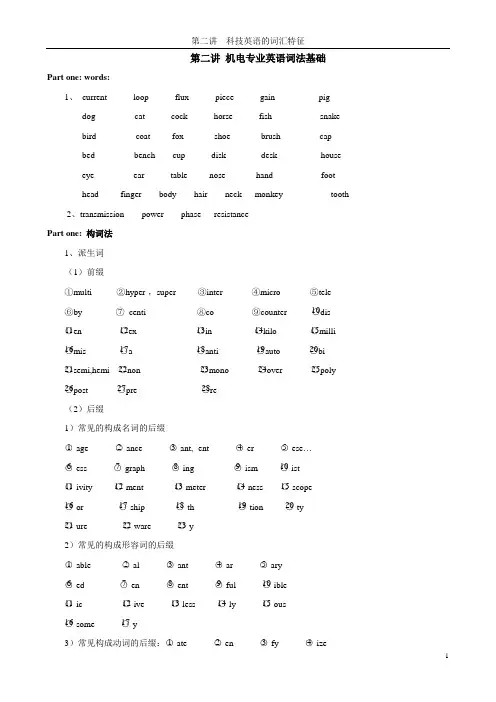
第二讲机电专业英语词法基础Part one: words:1、current loop flux piece gain pigdog cat cock horse fish snakebird coat fox shoe brush capbed bench cup disk desk houseeye ear table nose hand foothead finger body hair neck monkey tooth2、transmission power phase resistancePart one: 构词法1、派生词(1)前缀①multi- ②hyper-,super ③inter- ④micro- ⑤tele-10dis-⑥by- ⑦centi- ⑧co- ⑨counter- ○○11en- ○12ex- ○13in- ○14kilo- ○15milli- 16mis- ○17a- ○18anti- ○19auto- ○20bi-○21semi,hemi ○22non- ○23mono- ○24over- ○25poly- ○26post- ○27pre- ○28re-○(2)后缀1)常见的构成名词的后缀○1-age ○2-ance ○3-ant, -ent ○4-er ○5-ese…○6-ess ○7-graph ○8-ing ○9-ism ○10-ist○11-ivity ○12-ment ○13-meter ○14-ness ○15-scope16-or ○17-ship ○18-th ○19-tion ○20-ty○21-ure ○22-ware ○23-y○2)常见的构成形容词的后缀○1-able ○2-al ○3-ant ○4-ar ○5-ary○6-ed ○7-en ○8-ent ○9-ful ○10-ible○11-ic ○12-ive ○13-less ○14-ly ○15-ous16-some ○17-y○3)常见构成动词的后缀:○1-ate ○2-en ○3-fy ○4-ize4)常见的构成副词的后缀:○1-ly ○2-wards ○3-wise2、合成词1)合成名词○1名词+名词○2名词+动名词○3动名词+名词○4形容词+名词○5动词+名词○6副词+动词○7动词+副词2)合成形容词○1名词+现在分词○2名词+过去分词○3形容词+现在分词○4形容词+过去分词○5形容词+名词○6形容词+名词+ed○7形容词+形容词○8数词+名词○9数词+名词+ed10副词+现在分词○11副词+过去分词○12介词或副词+名词○3)合成动词:○1名词+动词○2形容词+动词○3副词或介词+动词3、转化法1)名词转化为动词2)动词转化为名词3)形容词转化为名词4、缩略词1)节略词(clipped words):maths, ad, dir, lab2)首字母(Initials):CAD, CAM, CAE, VM, QIS, DB, ES, CPU, DBMS,CGA,ROM, RAM3)缩写词(Abbreviation):e.g., Ltd., sq.5、拼缀法:programmatic,telecamera,comsat,forexPart three: Drills:1 There is no physical contact between tool and work piece.2 Public opinion is demanding more and more urgently that something must be done about noise.3 There is a wide area of performance duplication between numerical control and automatics.4 High-speed grinding does not know this disadvantage.5 You found that, in two experiments, hardness and greenness in apple went together with sourness.6 Gasses differ from solids in that the former has greater compressibility than the latter.7 The instrument is characterized by its compactness, and portability.8 The cutting tools must be strong, tough, hard and wear resistant.9 Dynamics is divided in to statics and kinetics, the former treating of force in equilibrium, the latter of the relation of force to motion.10 The image must be dimensionally correct11 The application of electronic computers makes for a tremendous rise in labor productivity.12 In any machine input work equals output work plus work done against friction.13 Scientists are confident that all matter is indestructible.14 Open the valve to let air in.15 It is a fact that no structural material is perfectly elastic.16 They said that such knowledge is needed before they develop a successful early warning system for earthquakes.17 A continuous increase in the temperature of the gas confined in a container will lead to a continuous increase in the internal pressure with in the gas.18 it is our great pleasure to note that China will sooner join the WTO.19 Like charges repel, while unlike charges attract.Things like air, water or metals are matter.Like knows like.I hope I can use the computer like you do.Do you like this color TV set?20 The instrument is very light.The cover of the meter is light blue.。
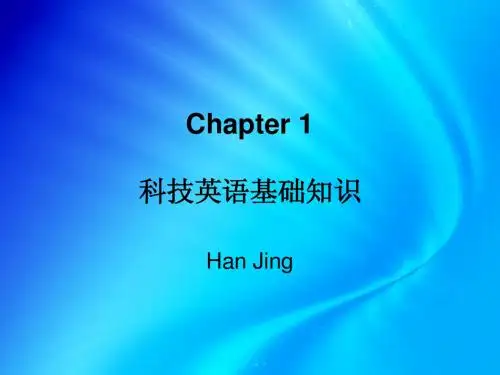
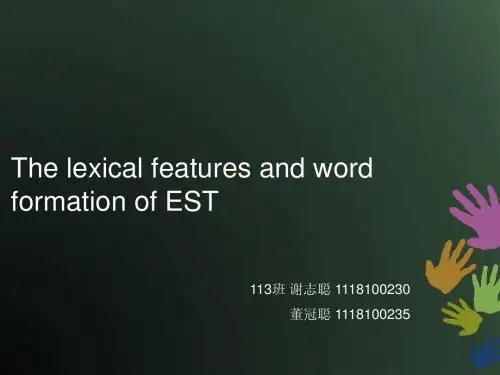
高中阶段的英语科技词汇英语知识点科技词汇在现代社会中扮演着重要的角色,而在高中阶段学习英语时,了解并掌握相关的科技词汇和英语知识点对于学生们的英语学习和日常生活都非常有帮助。
以下是针对高中阶段的英语科技词汇和英语知识点的详细介绍。
一、计算机和网络术语1. Computer(计算机)- 一种用于处理和存储数据的电子设备。
2. Laptop(笔记本电脑)- 一种小型便携式计算机,适合移动使用。
3. Software(软件)- 计算机程序和数据的集合,用于控制计算机的操作和功能。
4. Hardware(硬件)- 计算机的物理组件和设备,如CPU、内存、硬盘等。
5. Internet(互联网)- 全球范围内连接计算机网络的网络系统。
6. Website(网站)- 通过互联网访问的包含特定信息的网页集合。
7. Search engine(搜索引擎)- 通过关键词搜索互联网内容的网页工具,如Google、Baidu等。
8. Firewall(防火墙)- 一种用于保护计算机网络安全的安全系统。
9. Virus(病毒)- 一种可以感染并损害计算机系统的恶意软件。
二、手机和通讯术语1. Mobile phone(手机)- 一种可以进行无线通信的便携式电子设备。
2. Smartphone(智能手机)- 具有更高级功能和扩展能力的手机,如iPhone、Samsung Galaxy等。
3. Text message(短信)- 通过手机发送的文字消息。
4. Call(电话)- 通过手机进行语音通话。
5. App(应用程序)- 在手机上安装和运行的软件程序。
6. Bluetooth(蓝牙)- 一种无线技术,用于使不同设备之间进行数据传输和通信。
7. Wi-Fi(无线网络)- 一种无线网络技术,用于连接到互联网。
8. Social media(社交媒体)- 在互联网上进行社交和信息共享的平台,如Facebook、Instagram等。
第一节(略)第二节 Technical and Semi—Technical Words科技、半科技专业术语2。
1 Technical words 科技专业术语An ordinary reader or listener may find it difficult to understand the writing or speech composed purely in scientific language。
Words used in technical language present the first obstacle to those who have little or no specific knowledge in the related field。
The special vocabulary of EST includes technical and semi—technical terms.2.1。
1 Highly Specialized in Meaning 意义高度专业化With rapid development of science and technology,new terms are needed to define new phenomena and to explain new things and processes。
Often suitable terms have to be invented。
Scientists have been extending the vocabularies of their subjects for centuries and each subject has its own store of terms with precise and narrow meanings。
For example,stratosphere (同温层), quartz oscillator (石英晶体振荡器), seismology (地震学), polysomic (多倍体的), circumradius (外接圆半径), polystyrene (聚苯乙烯), leukocyte (白细胞),sequoia (红杉), etc。
第一节(略)第二节 Technical and Semi-Technical Words科技、半科技专业术语2.1 Technical words 科技专业术语An ordinary reader or listener may find it difficult to understand the writing or speech composed purely in scientific language. Words used in technical language present the first obstacle to those who have little or no specific knowledge in the related field.The special vocabulary of EST includes technical and semi-technical terms.2.1.1 Highly Specialized in Meaning 意义高度专业化With rapid development of science and technology, new terms are needed to define new phenomena and to explain new things and processes. Often suitable terms have to be invented. Scientists have been extending the vocabularies of their subjects for centuries and each subject has its own store of terms with precise and narrow meanings. For example, stratosphere (同温层), quartz oscillator (石英晶体振荡器), seismology (地震学), polysomic (多倍体的), circumradius (外接圆半径), polystyrene (聚苯乙烯), leukocyte (白细胞), sequoia (红杉), etc. You may find many such kind of words in this book.2.1.2 The Use of Prefixes and Suffixes 前缀后缀的使用Many technical terms are made up from Latin or Greek roots with prefixes (前缀) and suffixes (后缀). For example, the word polytetrafluoroethylene (聚四氟乙烯) is made up of five parts: poly- (前缀: 多,复,聚),tetra- (四), fluoro- (氟), ethyl (乙基,乙烷基), and –ene (后缀:烯属烃,苯属烃).Another example, geoastrophysics (地球天体物理学): geo-(地球), astro- (星,天体,宇宙), physics (物理学).Therefore, knowing the meaning of prefixes and suffixes can help you understand the meaning of the words.The following are some of the commonly used prefixes and suffixes in EST.1)Prefixes 前缀aero-: 空气,大气;气体;飞机;航空aerobiology (空气生物学,高空生物学); aeronautics (航空学,飞行学); aeromechanics (航空力学)astro-: 星,天体;宇宙astrodynamics (天体动力学); astrogeology (天体地质学); astronomy (天文学)anti-: 反,抗,阻;治,止;防止,中和antibody (抗体); anticancer(抗癌的); anticorrosive [防(腐)蚀(的)]auto-: 自动的,自动调整的;自己,本身autocontrol (自动控制); autoignition (自燃); auto-switch (自动开关)bio-: 生命;生物;生物学的biochemistry (生物化学); bioelectricity [生物(电流)]; biosphere (生物圈)cyber-: 计算机的;互联网的cyberaddict (网迷); cyberattack (黑客攻击); cyberspace (网络空间)de-: 离开;去除,减少deforestation (滥伐森林); desalter (脱盐设备); desensitizer (脱敏药)di-: 二,二倍,二重;双,联dioxide (二氧化物); diode (二极管); diproton (双质子)electro-: 电的;导电的;电解;电子(的)electroanalysis [电(解)分析]; electrobiology (生物电学); eletromagnetism (电磁,电磁学)geo-: 地球;土地geodynamics (地球动力学); geochemistry (地球化学); geoscience (地球科学,地学)hydro-: 水;氢化的hydrobiology (水生生物学); hydrocarbon (碳氢化合物); hydrology (水文学)infra-: 在下(部);亚,低,外infra-acoustic [亚(次)声的]; infrared [红外线(的)]; infrahuman (低于人类的动物,类人动物).in-: 非,无inactive (非活动性的); inorganic (无机的); instability (不稳定性)macro- 大,宏观的micro-: 小,微;扩大,放大microcomputer (微型计算机); microorganism (微生物); microscope (显微镜)mono-: 单,一monochromator (单色仪); monotreme (单孔目动物); monoxide (一氧化物)multi-: 多multiprocessing (多重处理); multipropellant (多元推进剂); multivitamin [多种维生素(的)]photo-: 光;光电;照相(术)photoconductor (光电导体,光敏电阻); photochemistry (光化学); photosynthesis (光合作用)radio-: 放射,辐射;无线电;射线radiobiology (放射生物学); radiodetection (无线电探测); radioelement (放射性元素)semi-: 半;部分的,不完全的(hemi-)semiconductor (半导体); semifluid (半流质的); semisphere [半球(形)]sub-: 在...底下;从属;次要;分(支);近(于)subcircuit [(分) 支电路]; subcompound (亚化合物); subsonic (亚音速的)super-: 超,超级super altitude (超高空), superfluid [超流体(的)], supersonic (超音速)tele-: 远距离;电信telecontrol (遥控); telemechanics (遥控机械学,遥控力学); telemetry (远距离测量技术)thermo-: 热thermodynamics (热力学); thermo meter (温度计,寒暑表); thermosphere (热大气层) thermostrans-: 转移;超越transgene (转基因); translunar (月球外侧的,月球轨道外的); transplant (移植,移栽)ultra-: 超,过;极端ultrasonic [超声(音速)的]; ultraviolet (紫外线); ultravirus [超显微(滤过性)病毒]2) Suffixes 后缀-fold: ...倍,...重,...次,...方fivefold (五倍的,五倍地); manifold (多样的,多方面的)-free : 不...,无... duty-freeice-free (不冻的); nuclear-free zone (无核区); oil-free (不含油的); static-free (不受静电干扰的)-gram: 图spectrogram (光谱图); bathygram [水(海)深图]; electrogram (电记录图)-cide: 杀灭剂;杀 suicide homicideinsecticide [杀虫(药)剂]; weedicide (除草剂)-meter: 剂,仪,表seismometer (地震仪); speedometer (速度计,里程计); multimeter (万用表)-ology: ...学,...论cosmology (宇宙学); psychology (心理学); seismology (地震学)-proof : 不透...的,防...的,抗...的,耐...的airproof (不透气的); fireproof (耐火的,不燃的); water-proof (防水的);heatproof [抗(隔、耐)热的];shockproof (防震的,防电击的) bulletproof-scope : 用于观察的仪器,镜microscope (显微镜) telescope (望远镜); spectroscope (分光镜); radioscope (放射镜)-tight: 不透的airtight (密封的,不透气的); watertight (不透水的,防水的)-therapy 治疗方法thermotherapy 温热疗法 hydrotherapy 水疗法2.2 Semi-Technical Words 半科技专业术语There are many words whose use is not confined to scientific and technological contexts, but they form an essential part of EST. They include some words formed from Greek or Latin roots like energy (from Greek) and efficiency (from Latin). However, most of them have been taken from everyday language and given a precise definition for scientific use. In other words, scientists take over these common words and convert them into technical terms by using them in a special way. As a result, the meanings of these words in their technical use are likely to differ from their non-technical meanings, and they may have different precise meanings in different technical fields.Thus the word “reaction” might in everyday context refer to one's reaction to hearing of an accident that happened to a family member, while in chemistry it might be used to refer to the reaction of ammonia with carbon dioxide to form another kind of substance; in nuclear physics it might refer to a nuclear chainreaction and in civil engineering it might refer to the reaction of a beam against the weight of a load placedon the beam.There are plenty of semi-technical words in EST, and the following are a few examples:• family一般意义:家,家庭;家属,亲属【动植物】科e.g. animals of the cat family (猫科动物)【化学】【数学】【天文】【地质】族e.g. the halogen family (卤族); family of functions (函数族)【语言】语族,语系e.g. the Indo-European family of languages (印欧语系)• focus一般意义:中心,重点【物理】焦点;焦距;聚光点e.g. real focus (实焦点); virtual focus (虚焦点); focus coil axis (聚焦线圈轴)【数学】焦点,中数【地质】震源,震中【医学】病灶;疫源点• force一般意义:力,力量;力气,精力【物理】力;力的强度e.g. force arm (力臂); air force [(空)气动力]; electromotive force (电动势); component of force (分力)【气象】风力等级e.g. a 12(th) force typhoon 12 级台风【计算机】强行置码• function一般意义:功能,作用;起作用【数学】函数e.g. Pure functions are easy for programmers to understand.对程序员而言纯粹的函数很容易理解。